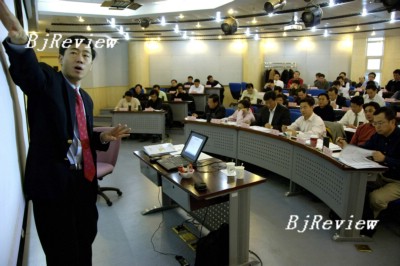
"I can feel growing problems in operating my company, and that's why I decided to take the EMBA course," said Lin Wen, boss of a private high-tech enterprise located in the south of China.
Since Lin launched the company in 2001, when he was 32 years old, the firm's assets have grown to 10 million yuan. Such rapid growth has brought with it new problems, according to Lin and "I need to find answers to these questions," he said.
The staff of Lin's company has snowballed from just the founders to a team of hundreds. "I began to have problems discussing issues with the managers in my company who have MBA degrees, as I myself did not specialize in economics and management," said Lin. "What's more urgent is that my company has come to a crossroads--how to cope with the intensifying global competition has been bothering me."
In Beijing, entrepreneur Chen Liqun, President of the Beijing Western-Style Food Association, is faced with the same problem. Aiming at a huge low-end consumer group, he has been promoting western food chains with "more dish varieties, lower prices and a better environment," but his businesses prospects currently look bleak.
"I wanted to know why my business was not a success," said Chen, who at the age of 47 became a student in an EMBA class at Guanghua School of Management, Peking University.
"Many of China's entrepreneurs grew up during the planned economy era, and they didn't get schooling in professional management in a market economy. Their success mostly depends on opportunities and their intuitive judgment of the market. That's to say, they lack the theories and professional skills," said Chen.
Though the tuition stands as much as 200,000 yuan, EMBA classes across various schools of management are filled with knowledge-hungry businessmen like Lin and Chen.
"To be proficient in both China's economy and company management, as well as international market rules, is what many Chinese entrepreneurs are longing for," Zhao Chunjun, former head of the School of Economics and Management of the Beijing-based prestigious Tsinghua University, said to explain the popularity of EMBA classes.
"Courage and insight are not enough, company bosses feel an urgency to upgrade their knowledge structures," added Zhou Chunsheng, Deputy Dean of Cheung Kong Graduate School of Business.
"I want to develop strategic management thinking and a global vision through the EMBA classes," said Lu Wenbing, Executive Vice President of Inner Mongolia Little-Sheep Catering Chain Company. He has flown from Hohhot of Inner Mongolia to Beijing every month for two years to attend a four-day-per-month EMBA class. "I never missed a class," he said.
| 